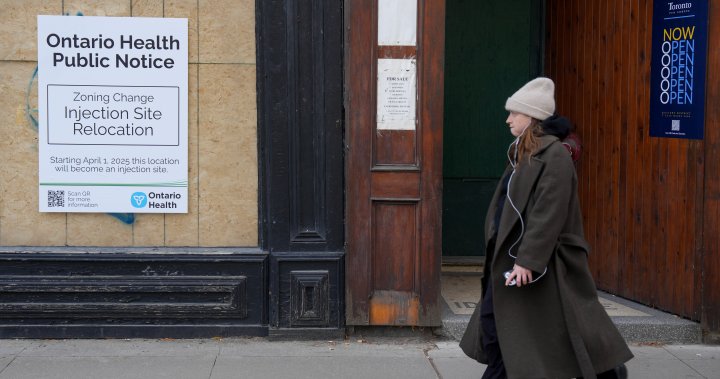The Ford government in Ontario, Canada, is proceeding with its controversial plan to reshape the province’s approach to addiction services. Nine of the ten supervised consumption sites (SCS) targeted for closure by March 31, 2025, have received approval to transition into what the government calls “HART Hubs” (Homelessness and Addiction Recovery Treatment Hubs). These hubs will prioritize addiction recovery and treatment, offering a range of services including highly supportive housing, but will not permit on-site drug consumption. The government justifies this shift as a move towards a more comprehensive approach to addiction, focusing on long-term recovery rather than harm reduction.
The decision to close the supervised consumption sites, announced in the summer of 2024, sparked immediate backlash from harm reduction advocates and health professionals. The government’s rationale centered on community safety concerns, citing the proximity of these sites to schools and childcare centers. The new legislation effectively prohibits SCSs within 200 meters of these institutions and requires ministerial approval for new sites, which the current Health Minister has indicated she will not grant. The move was accompanied by a $378 million investment over four years to establish 19 HART Hubs across the province. This funding aims to create approximately 375 supportive housing beds for individuals struggling with homelessness and addiction.
The nine SCSs designated for transformation into HART Hubs are spread across Ontario, including locations in Toronto, Ottawa, Thunder Bay, Guelph, Hamilton, and Kitchener-Waterloo. These sites, all publicly funded, will be operated by various community health centers and public health units. The transition process is expected to be completed before the March 31st deadline, at which point the supervised consumption services at these locations will cease. The government maintains that this shift will enhance access to mental health and addiction services, providing a pathway to recovery for individuals struggling with substance use.
However, the tenth site slated for closure, the Kensington Market Overdose Prevention Site in Toronto, faces a different fate. Unlike the other nine, this site is not government-funded and is currently engaged in a legal challenge against the government’s closure mandate. The Ministry of Health has remained tight-lipped about the status of this site and whether it has applied for HART Hub funding. A spokesperson stated that the review process for the remaining ten HART Hub locations is ongoing and that all applicants will be evaluated based on the same criteria and their ability to meet community needs. The announcement of the final ten locations is expected in the coming weeks.
The government’s decision to prioritize HART Hubs over SCSs represents a fundamental shift in its approach to addiction. While proponents of the change emphasize the importance of long-term recovery and treatment, critics express grave concerns about the potential consequences of eliminating safe consumption spaces. They argue that these sites play a crucial role in harm reduction, preventing overdoses and connecting individuals with essential health and social services. The Auditor General’s annual report revealed that the targeted SCSs prevented an estimated 1,579 fatal overdoses in 2022-2023. Furthermore, an internal government analysis identified a “high risk” that the new legislation would lead to increased emergency department visits, negative health impacts, overdoses, and deaths.
Despite these warnings, the government maintains that its new approach will ultimately benefit those struggling with addiction. Health Minister Sylvia Jones has defended the decision, arguing that merely observing someone inject drugs does not constitute healthcare. She asserts that the HART Hubs will provide individuals with the support and treatment necessary to achieve lasting recovery. Associate Minister of Mental Health and Addictions Michael Tibollo echoed this sentiment, stating that the hubs will break the cycle of addiction and homelessness. This clash of perspectives underscores the ongoing debate surrounding addiction treatment and harm reduction strategies. The ultimate impact of the government’s decision and the transition to HART Hubs remains to be seen, but the controversy surrounding the closure of supervised consumption sites highlights the complex and sensitive nature of addressing the opioid crisis.










